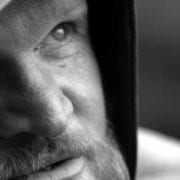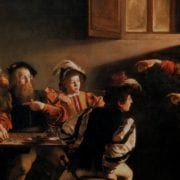Day 41: Why Do You Seek the Living Among the Dead?
BY CHRIS PRAMUK | April 10, 2017
Today’s Readings

“Mothers of the Disappeared” is the final track on Irish rock band U2’s 1987 album The Joshua Tree. Inspired by lead singer Bono’s experiences of traveling through Nicaragua and El Salvador in 1986 during a period of brutal civil war, the song has been described as a deeply moving “hymn to human rights,” and “a simple, plaintive lament of stunning beauty and sadness.”
Midnight, our sons and daughters / Were cut down and taken from us.
Hear their heartbeat / We hear their heartbeat.
In the wind we hear their laughter / In the rain we see their tears.
Hear their heartbeat, we hear their heartbeat.
Centered around a drone-like melody in the key of A, the hypnotic arrangement washes over the listener like a funeral lament. Lead singer Bono’s lyrics, sifted through the unutterable grief of Las Madres de las Desaparecidos, suggests that the dead are not dead. As is proclaimed in liturgies throughout Central America, in our remembrance and in our communion they are “Presente!”
The passage through Lent and Holy Week initiates our communal imagination into this unutterable mystery. It begins in a garden outside Jerusalem, when the friends of Jesus came to anoint his crucified body and were astonished to find the body gone. “Why do you seek the living among the dead?” they were asked. To say that the dead “are not here,” in this earth, this place of burial, may be to suggest in the very same breath that they are here. We simply need to know where to look, and how to listen. It is to follow our deepest intuition, as night cedes to dawn, that life reverberates beyond death, and that love endures beyond any earthly power to extinguish it.
So suggests U2 in “Mothers of the Disappeared.” The song will be my prayer throughout Lent and Holy Week. I invite you to let it be yours.
Christopher Pramuk, PhD, teaches courses in theology and spirituality at Xavier University in Cincinnati. He is the author of Hope Sings, So Beautiful: Graced Encounters Across the Color Line (Liturgical, 2013), a sustained meditation on race relations in society and church, and several award-winning books on Thomas Merton. In August 2017, he begins a new role as Chair of Ignatian Thought at Regis University in Denver.









So needed this week. Praying for all the lost daughters and sons in Egypt, Sweden and Syria. Praying for my Pope’s upcoming visit to Egypt. Please, dear God, peace.